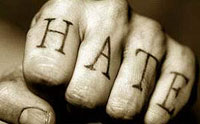Looking for Fascism? Welcome to Europe!
An extremist website in Latvia (one of the three Baltic States, a former Soviet republic), posted a message urging all Russians to leave the country voluntarily for their own safety. The message triggered yet another national hatred scandal in the country on the threshold of the 65th anniversary of Victory in the Great Patriotic War, which Russia will celebrate on May 9.

Latvian extremists collected over 8,000 signatures underneath their anti-Russian slogans.
“St. George Ribbons remind of dangerous people living among us. With our signatures we address those, for whom Latvia is a foreign state – go home!” the message said.
The slogan found its followers. A visitor of the website, who identified herself as Anita Chimale, wrote:
“Russians go to Russia! Stop stealing our wages! I am being fired because of Russians! Save your friend , kill a Russian,” she wrote.
The post appeared on the website on February 26 and was available there for several days. Latvian special services showed a very weak reaction to the scandal, although it is clear that it is a matter of inciting international strife.
Another similar scandal took place in Latvia in the beginning of February. Latvian extremists published the list of cars, whose owners decorated them with Russian flags or St. George Ribbons. They also posted private details of the owners of such cars – their home addresses, first and foremost.
The head of the Latvian Center for Human Rights stated that the publication of personal details of the people who decorated their cars with Russian symbols was an act of inciting ethnic hatred. However, Nils Muiznieks, the chairman of the European Commission Against Racism and Intolerance disagreed.
“Since there are no appeals to violence or discrimination, there is no incitement of national strife. It is a matter of public disclosure of personal data,” the official said.
Another local extremist organization – the Club of Latvian Nationalists – launched an online campaign calling upon everyone to spit and throw bricks at cars decorated with Russian flags.
Mr. Andris Jordans, a Latvian, found himself in a center of a criminal scandal in February of 2007, after he virtually proclaimed the need of ethnic cleansing in Latvia. He compared Jews and gypsies to gangrene, which should be cut out of the nation and said that “it would be just perfect.”
Latvian law-enforcement authorities originally claimed that it was just an expression of freedom of speech. However, they had to file a lawsuit against Jordans under the pressure from a UN spokesman, who warned the Latvian government of possible sanctions.
Jordans ’s lawyer said at court that his client did not propagate extremist actions and chose wrong words to express his ideas since his knowledge of Russian was poor.
As a result, the Supreme Court of Latvia acquitted Jordans at the end of February (he was previously sentenced to two years in jail for inciting ethnic strife).
It is worthy of note that a part of the Latvian establishment does not mind stepping aside from the anti-Russian course, which the republic has been following during the recent 20 years. Latvia suffered most in Europe from the financial crisis. Many had to take a different look at the state of internal affairs to discover that it would not be possible to avoid such problems in the future if the nation’s population – with 44 percent of Russian speakers – did not consolidate.
The Russian administration did not leave the events in Latvia out of attention. Russian Prime Minister Putin invited Latvian President, Valdis Zatlers, to come to Moscow for Victory Day celebrations. Mr. Zatlers accepted the invitation and said that Latvia was interested in building friendly relations with Russia.
Pravda.Ru interviewed Viktor Linnik, a member of the Conference of International Non-governmental Organizations, about the situation in the Baltic States.
“The highest level of the Latvian society is finally waking up. However, the nationalist constituent of the previously-run politics is still strong. Another thing seems to be different, though: why does Europe, the Parliamentary Assembly of the Council of Europe, tolerate fascist sentiments in the Baltic States?
“I visited Strasburg several times and I could see the influence of double standards and biased approach to things there. European officials probably use them to make their lives easier: there are certain stereotypes, the expected reaction of the general public, there are nations that shall be traditionally condemned. There is a whole group of East European nations in the EU that always speak ill of Russia. They won’t criticize each other, of course.
“One should bear in mind the fact that new NATO members obediently follow the politics of the US administration. That is why they can easily get away with many things: attempts to revise history and glorify Nazism, the ill attitude to the Russian language, the discrimination of the Russian-speaking population, etc.
“This has been going on for many years already. That is why there is nothing surprising about the fact that Latvian extremists feel free and comfortable there. It will take time to kill the bacteria of xenophobia,” the expert said.
Vladimir Potapov
Pravda.Ru
Russia Today: Typo promotes Latvian capital as 'hard to live'
Subscribe to Pravda.Ru Telegram channel, Facebook, RSS!





